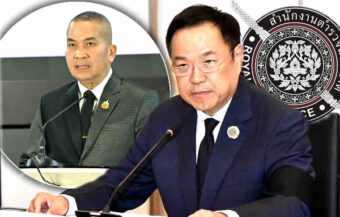Fake doctor Boonmak Phansila, 74, used stolen credentials to work nearly a decade at clinics in Bangkok, Chachoengsao and Rayong, duping patients and staff, exploiting hiring gaps and continuing his scam despite previous arrests before police finally caught him.
A 74-year-old chronic gambler who built a career faking medical credentials was arrested this week in Bangkok. Boonmak Phansila posed as a respected elder doctor at clinics and medical centres in Bangkok, Chachoengsao and Rayong, fooling patients and staff alike. Police revealed he had been arrested before for the same crime but escaped punishment, only to continue his lucrative scam as a quack masquerading as a fully qualified physician. He obtained fake credentials by downloading online profiles and certificates belonging to real doctors. Staff at the clinic where he worked said that, despite his fraud, he often humoured questions from juniors, carefully weighing opinions on his prescriptions and decisions.

Bangkok police have arrested a 74-year-old man who had been impersonating a licensed doctor for years. The suspect, identified as Boonmak Phansila, used forged documents to secure part-time work at medical clinics across multiple provinces. He was apprehended on Thursday at a clinic in the Lat Phrao area by officers from Metropolitan Police Division 3.
Boonmak worked under the name “Dr. Manit Charuwan,” presenting falsified identification cards and medical licenses to treat patients under the National Health Security Office (NHSO) scheme. Investigators said he carefully maintained the façade to avoid suspicion, relying on his age and calm demeanour.
Police launched an undercover investigation after receiving complaints about his qualifications and some unusual treatments. Moreover, several patients reported that his medical advice did not follow standard practices, raising serious concerns.
Undercover investigation confirms suspect Boonmak posed as a fully licensed doctor across multiple provinces
A detective with a medical degree from Beijing Medical University, currently awaiting his Thai medical license, infiltrated online groups recruiting part-time doctors. Consequently, authorities confirmed that Boonmak had been impersonating a qualified practitioner.
Investigations revealed that Boonmak had a long history of similar offences. He had previously been arrested twice for impersonating a doctor. Most recently, in 2017, he forged documents to work in the infirmary of NTN Manufacturing (Thailand) Company in Rayong Province for about two years.
Following this, he was arrested in 2019 by officials from the Rayong Provincial Public Health Office and the local police. During that operation, authorities seized a nursing logbook, a doctor’s timesheet, four controlled drugs and medical council certification documents.
He was taken to court and released on bail while appealing to the Supreme Court.
However, Boonmak refused to attend the verdict, which was read in absentia. He was sentenced to one year and two months in prison. After fleeing, the Rayong Provincial Court issued an arrest warrant on November 30, 2022, for offences related to falsified documents, violations of the Medical Professions Act and breaches of the Drugs Act.
Despite previous arrests, Boonmak returned to part-time work, exploiting clinic hiring loopholes and high pay
Despite these previous convictions, Boonmak returned to part-time medical work. He applied online to multiple clinics in Bangkok, Chachoengsao and Rayong, exploiting gaps in hiring processes. Furthermore, he relied on the lucrative pay, which ranged between ฿500 and ฿1,000 per hour, to justify the risk. Police warned that loopholes make it easier for criminals to infiltrate clinics under the guise of licensed physicians.
At the Lat Phrao clinic, nurses suspected that Boonmak used forged credentials to secure employment. Nevertheless, they referred to him as “Professor Doctor” due to his age and the respect he commanded.
Staff became concerned only when his prescribed treatments appeared unusual or inconsistent with accepted medical standards. Additionally, he often adjusted his diagnosis when questioned, apparently to maintain his credibility.
During questioning, Boonmak admitted to forging documents belonging to Dr. Manit Charuwan, with whom he had previously worked. He confessed that he pursued the deception because doctors earn good money, but he frequently squandered the earnings on gambling. Police said that this pattern of behaviour made him a repeat offender, raising broader public safety concerns.
Police identify Boonmak at Lat Phrao clinic after inspecting documentation and seeing him treat patients
On September 3, 2015, investigators visited the Tong Dee Tai Kai Clinic on Soi Lat Phrao 48, Samsen Nok Subdistrict, Huai Khwang District, Bangkok. They discovered a photograph of Boonmak outside the examination room labelled “Dr. Manit Charuwan.” Additionally, he was seen treating a patient using NHSO benefits. Consequently, authorities identified him as the individual named in the existing arrest warrant.
Officers found a rubber stamp with the name “Dr. Manit Charuwan” and the clinic’s OPD card displaying the same name. They immediately arrested him, shocking both patients and clinic staff. Nurses later explained that they initially trusted Boonmak because he appeared knowledgeable and elderly.
However, some of his prescriptions were unusual, and certain treatments did not align with current medical standards. Nurses sometimes hesitated to question him because of his apparent authority.
Police Major General Kiattikul Sonthinen, Commander of Metropolitan Police Division 3, emphasised the dangers of impersonating a doctor. He said that such criminals pose a significant threat to public health, both by seeking personal gain and by administering unsafe treatments. Furthermore, he highlighted that part-time recruitment practices in clinics have created gaps that impostors exploit.
Boonmak’s previous arrests show a repeated pattern of deception and clever evasion of law enforcement
Boonmak’s previous arrests reveal a calculated pattern of deception. In 2017, he worked for approximately two years at NTN Manufacturing’s nursing room after forging documents. In 2019, authorities seized evidence, including controlled substances, official logs, and certification papers. Despite his sentencing, he managed to evade enforcement, ultimately returning to similar offences.
His methods relied heavily on observation. Boonmak studied real doctors closely and imitated their behaviour, gaining enough skill to convince patients of his legitimacy. Additionally, he forged official documents to provide a veneer of authenticity. Investigators said this combination of tactics allowed him to operate undetected for months at a time.
Staff at the Lat Phrao clinic stated that, despite occasional suspicions, they often deferred to him because he carried himself as a professional. Consequently, he was able to continue practising under the NHSO scheme for several weeks.
However, unusual prescriptions and inconsistent diagnoses eventually triggered formal complaints. This led to the undercover investigation that ultimately exposed him.
Boonmak’s case highlights systemic vulnerabilities in clinic hiring and gaps exploited by fraudulent doctors
Police noted that Boonmak’s case highlights broader systemic vulnerabilities. Clinics often do not rigorously verify credentials for part-time doctors, leaving patients at risk. Additionally, the financial incentives associated with hourly pay for temporary physicians make such positions attractive to impostors. Senior officers emphasised the need for stricter verification and oversight to prevent similar incidents.
During interrogation, Boonmak admitted that he deliberately sought part-time work at multiple medical facilities. He acknowledged that his primary motivation was financial gain, which he frequently lost to gambling. Police said his confession highlights the persistent threat posed by repeat offenders in healthcare settings.
On Thursday, September 4, 2025, Boonmak was brought to Rayong Provincial Court to face charges including document falsification, violations of the Medical Profession Act, and breaches of the Drug Act. Authorities said additional charges related to his conduct at the Lat Phrao clinic will be filed with the Sutthisan Police Station.
Officials warned that Boonmak’s arrest is a cautionary tale. Impersonating doctors endangers patients, undermines public trust, and exploits gaps in clinic hiring practices. Police, meanwhile, continue to investigate his activities to ensure all victims are identified and prosecuted.
Staff and patients shocked as Boonmak’s long deception reveals urgent need for verification and vigilance
The case has shocked medical staff and patients alike, who described the revelation as “unbelievable.” Nurses said that, despite some doubts, they were reluctant to confront Boonmak, given his age and commanding presence. Police said his confidence and long experience in deception made him particularly dangerous.
Boonmak’s arrest emphasises the need for vigilance in medical institutions. Clinics are urged to verify licenses and credentials rigorously. Furthermore, senior police this week insisted on the importance of reporting suspicious behaviour immediately to prevent harm.
This case is part of a broader pattern of criminal impersonation within healthcare settings. Police warned that individuals who exploit recruitment gaps can operate undetected for long periods. They called on both clinics and patients to remain alert.
Boonmak’s fraud shows how impersonating doctors exploits trust and can severely endanger patient lives
Boonmak’s actions demonstrate how fraud can endanger lives while exploiting trust in medical professionals.
Police confirmed that Boonmak will face full prosecution and that investigators will continue monitoring clinics to prevent similar offences. They also reiterated that impersonating a doctor is a serious crime under both the Medical Profession Act and the Drug Act. Top police officers on Thursday stressed that violators could face imprisonment and fines.
Police doctor jailed after she did not seek bail. Details emerge of her tight prescription drug network
Chinese mafia links as a police doctor is busted for Bangkok prescription drug racket driven by the dead
Boonmak’s long history of deception, previous arrests and repeated offences makes him a particularly concerning case. Detectives are urging the public to verify doctors’ credentials and report suspicious activity. The arrest serves as a reminder that even experienced professionals can exploit trust if oversight is lax.
Join the Thai News forum, follow Thai Examiner on Facebook here
Receive all our stories as they come out on Telegram here
Follow Thai Examiner here
Further reading:
Dark web Xanax counterfeiting gang managed from Thailand smashed in the UK with 10 people convicted
Unlikely rags to riches convict star arrested again in Thailand over online gambling promotion
Iconic 70s Bangkok comes to life again as the dark story of The Serpent wows world Netflix audiences
Calls for murdered Norwegian woman’s Japanese killer to be brought to justice if found in Thailand


















